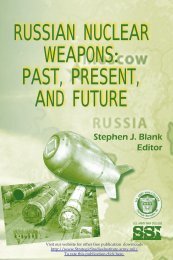The United States and China in Power Transition - Strategic Studies ...
The United States and China in Power Transition - Strategic Studies ...
The United States and China in Power Transition - Strategic Studies ...
You also want an ePaper? Increase the reach of your titles
YUMPU automatically turns print PDFs into web optimized ePapers that Google loves.
would be responsible to the world, they argued, but<br />
not just to the <strong>United</strong> <strong>States</strong> <strong>and</strong> the West alone. <strong>The</strong>y<br />
also po<strong>in</strong>ted out that although the responsible stakeholder<br />
designation suggested that the <strong>United</strong> <strong>States</strong><br />
welcomed <strong>Ch<strong>in</strong>a</strong> <strong>in</strong>to the “club of great powers,”<br />
<strong>Ch<strong>in</strong>a</strong> would still be treated differently; it would be<br />
an <strong>in</strong>sider <strong>in</strong> name but an outsider <strong>in</strong> fact for a long time<br />
to come. <strong>Ch<strong>in</strong>a</strong> would be better served to cont<strong>in</strong>ue its<br />
tao-guang yang-hui <strong>and</strong> focus on its development. 63<br />
ENDNOTES - CHAPTER 3<br />
1. Li Hongzhang (李鸿章), “筹议海防折” (“On Coastal Defense”),<br />
李鸿章全集 (Complete Works of Li Hongzhang), Tianj<strong>in</strong>,<br />
<strong>Ch<strong>in</strong>a</strong>: Baihua Wenyi Chubanshe, 2000.<br />
2. Similar to the isolated Q<strong>in</strong>g Dynasty, Japan had a “Closed<br />
Country Edict” prohibit<strong>in</strong>g Japanese contact with the outside<br />
world dur<strong>in</strong>g the Tokugawa period from 1836 to 1860 when<br />
the Meiji Reformation was launched. Also similar to the forced<br />
open<strong>in</strong>g of Q<strong>in</strong>g <strong>Ch<strong>in</strong>a</strong>, Japan encountered the U.S. <strong>in</strong>truder,<br />
Commodore Matthew C. Perry, <strong>and</strong> his Black Ships <strong>in</strong> 1853. <strong>The</strong><br />
Americans dem<strong>and</strong>ed the open<strong>in</strong>g of Japan to foreign trade <strong>and</strong><br />
commerce.<br />
3. See <strong>Ch<strong>in</strong>a</strong> Modernization Report, 2008, Beij<strong>in</strong>g, <strong>Ch<strong>in</strong>a</strong>: Beij<strong>in</strong>g<br />
University Press, 2008. Specifically, the Report notes that Japan<br />
positively pursued learn<strong>in</strong>g from the West <strong>and</strong> transformation<br />
<strong>in</strong> an all-round way whereas <strong>Ch<strong>in</strong>a</strong> held reservations especially<br />
on the socio-political aspects of change <strong>and</strong> lost the opportunity<br />
to modernize properly (p. iv). See also Barr<strong>in</strong>gton Moore’s classic<br />
discussion <strong>in</strong> Social Orig<strong>in</strong>s of Dictatorship <strong>and</strong> Democracy: Lord<br />
<strong>and</strong> Peasant <strong>in</strong> the Mak<strong>in</strong>g of the Modern World, Boston, MA: Beacon<br />
Press, 1966.<br />
4. President George W. Bush’s National Security Strategy of<br />
2006 was right on the mark to make the same po<strong>in</strong>t.<br />
5. <strong>The</strong>re are numerous Ch<strong>in</strong>ese studies about the difference<br />
between Ch<strong>in</strong>ese <strong>and</strong> Western th<strong>in</strong>k<strong>in</strong>g <strong>and</strong> the <strong>in</strong>ability of the<br />
63

















